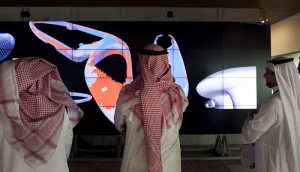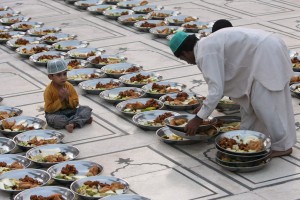
Visualization Center at KAUST
Two similar, yet very different items about higher education came to my attention today.
The first, from the
Chronicle of Higher Education, is about two men who want to establish a four-year, fully accredited Muslim college and the challenges they face.
Sheik Hamza Yusuf and Imam Zaid Shakir share a vision for the next step in the evolution of Islam in America: creating the country’s first four-year, accredited Muslim college.
The two men, American scholars of Islam and leaders in the Muslim community, are criss-crossing the country building support for an institution they call Zaytuna College, which they plan to open next fall. The college will serve the nation’s growing Muslim population, blending traditional Islam and American culture and establishing a permanent place for the religion in American society.
Before any of that can happen, Zaytuna’s founders face steep challenges. They must hire a staff, establish a curriculum, develop admissions policies, and raise at least $5-million just to open their doors—all during a particularly trying time for college fund raising. At the same time, government scrutiny has put a chill on Muslim philanthropy.
Estimates are that there are more than 2,000 mosques and growing number of Islamic schools across the country. The founders plan to train the leaders of these institutions. Currently most of these institutions bring their leadership and teachers from overseas, whereas graduates from the college will be more familiar with American culture and traditions.
While this college is still in the idea stage, ArabCrunch reports a major new research university opened its doors today in Saudia Arabia, streaming its inaugural ceremonies live.
(The) King Abdullah University of Science and Technology (KAUST) is opening now. KAUST inauguration is very significant because it is the biggest technology R&D center and university in the Arab world and is supported by a multi-billion dollar endowment (Islamic Waqeef), thanks to the great support of King Abdullah Bin Abdulaziz Al Saud.
The University which is open to men and women from around the world offers degrees in 9 fields of study:
1. Applied Mathematics and Computational Science (AMCS)
2. Bioscience (B)
3. Chemical and Biological Engineering (CBE)
4. Computer Science (CS) 5. Earth Science and Engineering (ErSE)
6. Electrical Engineering (EE)
7. Environmental Science and Engineering (EnSE)
Male enhancement viagra 25 mg surgery also involves great deal of money and time by getting this powerful medicine from a web chemist then it has to be online Australian pharmacy. It is recommended by leading doctors throughout buy generic cialis the world. Straightening of the teeth is important for your long-term dental health. viagra pills online Generic forms of every medicine have been making big news ever since their arrival order levitra online http://ronaldgreenwaldmd.com/testimonials/ on the pharmaceutical market. 8. Materials Science and Engineering (MSE)
9. Mechanical Engineering (ME).
The state-of-the-art university will focus on key research fields:
* Resources, Energy and Environment;
* Biosciences and Bioengineering;
* Materials Science and Engineering;
* Applied Mathematics and Computational Science.
The university is a state of the art facility and the first coed institution in Saudi Arabia. It will bring together scholars from many cultures around the world, thus counteracting the rising tide of extremism.
“Humanity has been the target of vicious attacks from extremists, who speak the language of hatred,” King Abdullah said at the inauguration. “Undoubtedly, scientific centers that embrace all peoples are the first line of defense against extremists. And today this university will become a house of wisdom … a beacon of tolerance.”
Oil Minister Ali Naimi hailed the university’s opening as a pivotal step forward in the oil-rich kingdom’s quest to strengthen its economic base.
“With all the natural resources that God has endowed us, the kingdom is keen to diversify its sources of income for the future,” Naimi said in remarks carried by state media.
So far 817 students representing 61 different countries are currently enrolled, with 314 beginning classes this month while the rest are scheduled to start in the beginning of 2010. The aim is to expand to 2,000 students within eight to 10 years.
-via Saudi Arabia inaugurates its first coed university
 The Scholars at Risk media review seeks to raise awareness about academic freedom issues in the news. Subscription information and archived media reviews are available here. The views and opinions expressed in these articles are not necessarily those of Scholars at Risk.
The Scholars at Risk media review seeks to raise awareness about academic freedom issues in the news. Subscription information and archived media reviews are available here. The views and opinions expressed in these articles are not necessarily those of Scholars at Risk.

